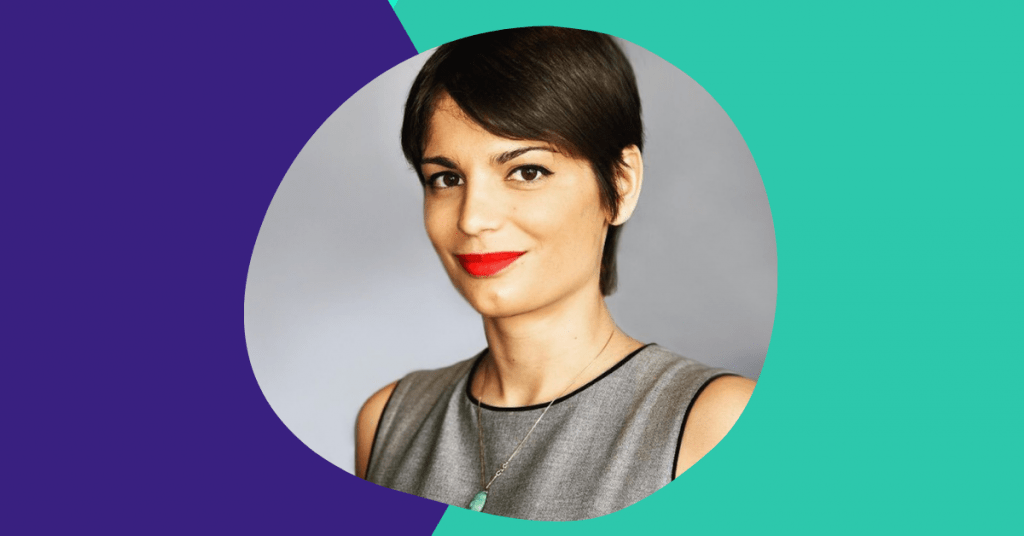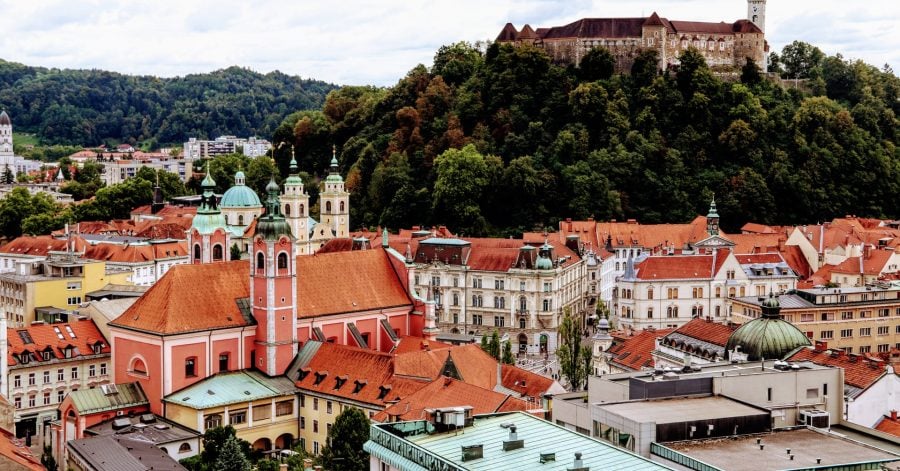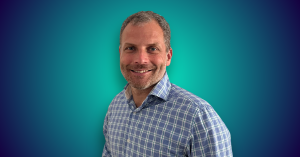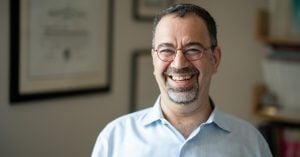“If you look at energy transition scenarios and forecasts, such as the ones of the International Energy Agency, energy efficiency can contribute around 25% of emissions reduction. Even if it is possibly the least glamorous part of the energy transition, it is a big part of how we make what we already have run better,” begins Mia Kovačić, telling the story of Ljubljana’s energy retrofitting.
So far, Resalta, a Slovenian provider of energy services in Central and Eastern Europe, has implemented three retrofitting projects in the city. The first one was signed off in 2017 and included 48 buildings, helping reduce energy consumption by 8000 MWh every year and cut CO2 emissions by 3000 tons. This is the equivalent of planting 175K trees. To date, the projects covered 90 buildings.
“Energy retrofits imply that we go through a variety of municipal buildings, ranging from administrative buildings to schools, kindergartens, sports centers, and we implement every possible solution that will reduce energy consumption and CO2 emissions. This includes lighting retrofits, insulation, and facade retrofits. Within the project, we also changed the power sources to sustainable ones. So, we installed heat pumps that use geothermal energy to provide fully sustainable heating,” further explains Mia Kovačić.
While The Recursive previously discussed challenges and plans regarding renewable energy projects in the region, today, we focus the lens on the less fashionable, yet equally necessary energy efficiency part of the equation. In an interview with Mia Kovačić, Marketing Director at Resalta, we’ll learn more about how cities and municipalities can go green with the help of a private partner, the key elements of a smart city, and other key lessons from the company’s experience in the sector.
The Recursive: How was Resalta founded and what were the company’s key milestones along the way?

Mia Kovačić: This year was our 10 year anniversary. Our CEO Luka Komazec was also the founder. He was working in one of Slovenia’s largest industrial companies, Gorenje, when he saw an opportunity in the market for a company that would be dealing with energy efficiency and optimizing processes, such as lowering emissions. He got onboard two large utilities in Slovenia, Energetika Ljubljana and Gilpin, and Gorenje.
One of our milestones was developing our first biomass combined heat and power plant. This started construction in 2016, in Croatia. It is a five megawatt sustainable power plant that would produce both green electricity and green heating, capable of powering 500 households.
A big milestone for us was the energy retrofitting of the city of Ljubljana. This project was awarded by the European Commission in the Best Energy Service Project category a couple of years ago.
Another important milestone was when BlackPeak and PostScriptum Ventures joined our shareholder structure in 2015. In 2019, the European Investment Fund with the Slovenian SID Banka also joined our shareholder structure, and we received a 12 million euro loan from the European Investment Bank in 2020.
Overall, we helped reduce over 80,000 tonnes of CO2 across eight countries.
You serve a very wide audience – public, business, and industrial sector clients. What are the main differences in the pain points and needs of your customers in terms of energy efficiency?
The priorities and concerns are different. When we’re working with cities and municipalities, we do this under a model called public-private partnership, which means the public partner publishes a tender for an infrastructure project that needs to be carried out, and the private partner applies with a proposal for how to develop this project, then implements it and in most cases finances it. The City of Ljubljana project was co-financed with EU and EIB funds, but the degree of financing varies.
But not all municipalities and cities are open to this kind of partnership. We’ve also done a lot of these in Serbia, where we had to really break the ice, and do awareness campaigns. There are also a lot of actors involved and there’s a lot of accountability to the citizens.
So it’s sort of a long process, with many elements that you wouldn’t take into account with private companies. Businesses tend to look at the bottom line first and foremost. Some companies are also strongly committed to the clean energy transition, which makes our job easier. And sometimes there are companies that don’t really see why they should change the way they do what they do and they prefer to wait.
If we’re working with industrial clients, we often need to have very specific expertise regarding their production processes. There’s a lot that we need to take into account when doing process optimization projects so that we don’t disturb production
In parallel, when we work with the public sector, we need to first take into account not to disturb the public. When we do projects with schools, we do them over the summer holidays. We need to make sure everyone’s comfortable and things are still functional.
We are facing a lot of obstacles in the Balkans when it comes to the clean energy transition. Which are the most enduring challenges?
There are big differences between, for example, Slovenia and Serbia or Bulgaria. But one of the most enduring or pervasive challenges is that people don’t take climate change very seriously, or the energy transition is never a priority. To the end that people are still going to prioritize the cheapest solutions. And the problem is that the cheapest solution today is not only not going to be the cheapest solution in 10 years, but it’s probably going to be very costly when the pressure is much stronger to decarbonize.
Since we started one of the big challenges was educating the market and raising awareness. Even if in countries like Slovenia, people are aware of the importance of the energy transition, they’re not always going to make the right choices.
I think the public sector is much more likely to push for clean energy solutions because they know that the people care about it, whereas in the private sector, people are waiting to see what’s going to happen in the next few years, expecting stronger incentives, or just looking at the bottom line first. I have to point out that this also hugely depends on the company and municipality. In brief, things are just not moving fast enough but we are trying to speed them along.
How can startups and companies with solutions in the energy field help with surpassing these challenges in working with both the public and private sectors?
First of all, we do see that things are changing slowly as countries adopt different laws, with a lot of push from the EU. But for startups and companies to meet these needs, it’s a question of finding the right solutions. There’s always something very specific that companies and municipalities will go for.
Finding the right financing solutions has also been very important, because if there’s not enough money, it’s difficult to develop any kind of product.
So, finding the right financing options and the right services that clients will really need and that will generate visible benefits is a good place to start.
Can you help us paint a picture of the smart city of the future in Southeast Europe? What are the key elements?
Ljubljana is a great example because they are incredibly ambitious. A smart city is a city that focuses on smart and innovative solutions that put people and the environment first.
In Ljubljana, there is a lot of investing in green spaces and pedestrian spaces. They discourage the use of cars in the city centre, in favor of bicycles through bike sharing programs. There’s also electric car sharing – for elderly residents you have electric golf carts that can take them around where they need to go. They’re working a lot to encourage people to be mobile in sustainable ways, to make it easy to get around, to make a lot of public services very user friendly.
There’s a reason why it was the European Green Capital in 2016 – you can see the results of their commitment to becoming a smart city.
What are Resalta’s plans going forward?
Historically, we were focused on certain types of renewables and energy efficiency projects. Now, we are taking a more holistic approach to offering decarbonisation services. And we want to be able to help our clients that have targets and know they should have targets. We’ve seen a very real need for that and we have the experience and the expertise. But this is also a reflection of the shift in mindsets. It’s something that the market was not concerned about five years ago. It’s still slowly changing, but given the EU 2030 targets, this is something that companies really need now – partners to help them get to net zero, to take them through carbon audits, setting targets, and implementing energy reduction projects.
What were your key lessons along the journey that you would pass on to other professionals?
One thing I noticed very much in everyday life and my work is that there’s a lot of talk about ESG and about mission driven companies, but in the end, there’s no amount of marketing work that can cover you up if your mission is not real and if the people working behind it don’t really feel it. The one thing about Resalta was that everybody that I worked with believed in the importance of the work that they were doing, which made for me the whole working experience much stronger and credible. Seeking out authenticity and real commitment to a cause lead to much more fulfilling work.
If you liked this read, you may also enjoy our article on how drone inspection can drive efficiency in renewable energy.








